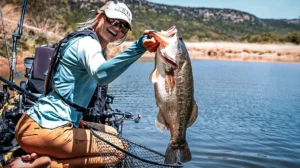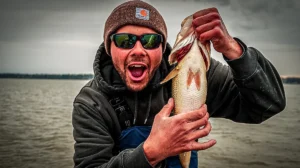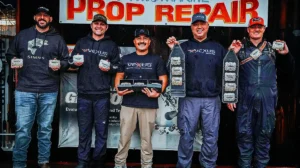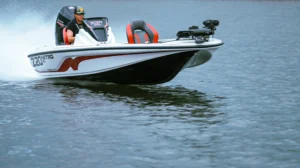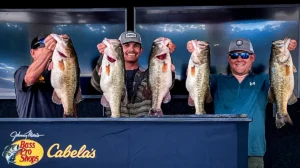Which of these three early 80s bass fishing icons doesn’t belong?
In 1980, a grizzled Bo Dowden traveled up yonder to New York and showed the nation how to win a Classic Louisiana style, with the venerable jig and pork.
In 1982, Paul Elias dipped his Smith Brothers beard down towards the water, focused a steely glint in the direction of underwater structure, and cranked up a Classic win of his own.
And in between those two iconic victories, a cherub-faced Georgian, only a few years out of high school, claimed a Classic trophy of his own. Stanley Mitchell could catch fish as well as any of them, but his humility and aw shucks demeanor seemed to separate him from the rest of the fishing fraternity.
It was a pivotal time for the Bass Anglers Sportsmans Society. From their hairy-legged roots in the 60s and 70s, Ray Scott sought to further distance himself from the frozen fish derbies and stringers full of dead fish of years gone by. This was big time stuff – the first indoor Classic weigh-in and a whopping forty grand for first place.
Step back and think about it for a moment – there wasn’t any dropshotting, not much Carolina rigging, and swimbaits weren’t even on the horizon, or if they were in use, no one was talking about any of them.
No NASCAR-styled garb, either. Maybe a polyester jumpsuit here and there, a patch vest or two. Mitchell himself wore a down vest from the local outdoors shop, his name neatly embroidered and a patch or two positioned where he thought it might get his sponsors some exposure. But there was nothing exceptionally calculating about it. The smile was genuine and the win was untainted. The best word for it might be “pure.”
Now it’s nearly 30 years later, and Mitchell is far from old, not yet even 50. Dowden has been out of the game for a while, selling real estate in the Toledo Bend region. Elias is still casting for cash successfully, with a $100,000 victory on Falcon not far in his rear view mirror.
And where’s Stanley?
“I’m retired more or less from fishing and from work,” he said. “I sold my part of my timber business and now me and my brother and sister have 7,000 acres.”
He’s been away from tour-level fishing for a couple of years now: “About two or three years ago, I was fishing the Kentucky Lake FLW and I had a good tournament, finished maybe 23rd or 24th. I was going to go to the next one at Champlain, but I took a hard hit on my back. It was my own fault. One disc was bulging real bad, it was burning down my legs.”
While he might not have wanted to be forced out that way, he’s proud that his last finish was a good one. So what does he do now that he can’t fish competitively? He hunts and fishes, of course.
“Pretty much whenever the weather looks good, I go,” he said.
“I’ve gotten heavily into saltwater fishing for redfish and trout. I do it on the coast. People there don’t really keep up with bass fishing, so even though people remember who wins the Classic, I don’t get recognized all that much.”
He does, however, get recognized at places like the Atlanta Motor Speedway, owned by a friend of his, where the admirers regularly approach him.
“I still love to bass fish, and I do it a lot on the river at home, but it’s probably half and half, bass and saltwater, now.”
As his final showing on the FLW Tour proved, it wasn’t a lack of talent that caused him to leave, and his Classic win wasn’t his only victory. He also won a Top 100 in 1992 and was part of the victorious team in the 1987 Bassmaster Team Championship.
Could he come back now?
“I’m not going to say I won’t ever come back. It’s hard not being with my friends.”
Indeed, that’s what he misses the most about being away from the scene, the camaraderie. “I don’t miss the motels and the driving,” he said.
Does he follow the leagues?
“A little bit. I talk to my buddies more than I look at it on the computer.
People like Mark Hardin, Tom Mann Jr. and Denny Brauer.”
He was turkey hunting with fellow pro Lendell Martin when BASS was at Amistad, so he and his brother made the drive over on the competition day that was cancelled. As Yogi Berra would say, it was “like déjà vu all over again.”
“It was good to catch up,” Mitchell said. “I saw Denny, Gary Klein, Mike Wurm, Ray Sedgwick and Ken Cook.”
He also got a glimpse of the difference between today’s schedule and some of the clunkers (early 90s Harris Chain derby anyone?) from the past: “BASS has really come up with a great schedule now,” he said.
He and Brauer still pal around some. In fact, Denny and Shirley stopped by a few weeks ago for some red fishing and turkey hunting. That may have ignited some competitive fire in Mitchell, who is younger than Brauer and has had fewer back surgeries.
But whether or not he returns to competition or is content to fish for leisure, he may forever keep the title of youngest Bassmaster Classic winner.
“I was fortunate to win that early. Maybe at 30 I would’ve known how to capitalize on it better, but everything has to be perfect to win that tournament. I had maybe seven or eight boats follow me the next year. Now poor Boyd had 50 or 60.” He also noted that he won it deep, with a Bomber Model A crankbait and a Luhr Jensen spoon. A competitor with a shallower pattern might not be able to maintain his catches over three days.
A little over a decade after Mitchell’s big win, another twenty-something angler won the Classic. He was a few years older than Mitchell had been, but Bryan Kerchal shocked the angling world just the same.
“I actually got to know him the previous year when he fished his first Classic,” Mitchell said. “He mostly kept to himself and was as nice and polite as can be. Just a great kid who got killed so quick.
“Whenever you’re young like that, you don’t worry about much, just fishing.”
He could’ve been speaking about himself.





